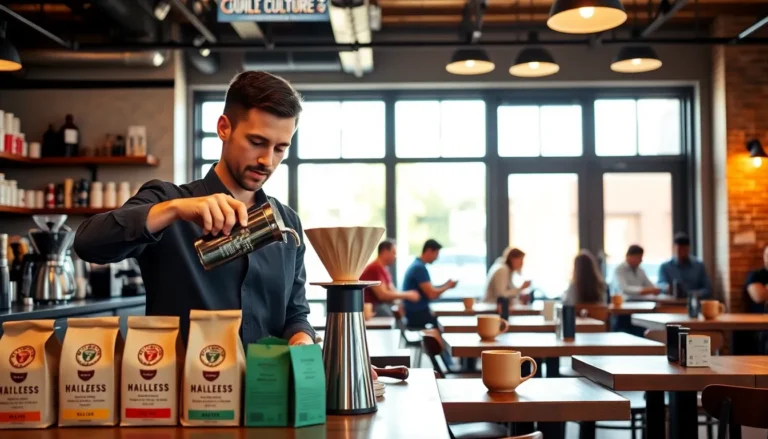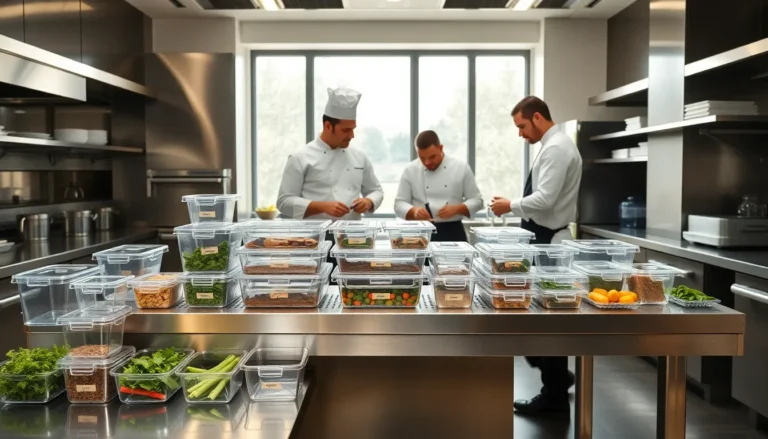Coffee isn’t just a drink; it’s a culture that brews connections, creativity, and a whole lot of caffeine-fueled conversations. From the bustling cafés of Paris to the serene tea houses of Kyoto, coffee culture wraps its warm embrace around people, sparking friendships and fueling ideas. Whether it’s a quick espresso shot or a leisurely pour-over, each cup tells a story steeped in tradition and innovation.
Table of Contents
ToggleWhat Is Culture Coffee?
Culture coffee refers to the diverse practices, rituals, and social connections that arise from the enjoyment of coffee. This cultural phenomenon extends across the globe, where coffee transitions from a simple beverage to a vector for community and creativity. Coffeehouses, for example, often serve as venues for art, intellectual discourse, and social engagement.
In vibrant cities, coffee culture manifests in unique ways. Brazilian coffee farmers cultivate beans that reflect regional traditions and flavor profiles. Ethiopian coffee ceremonies highlight the ceremonial preparation and enjoyment of coffee as a communal experience. Each culture presents its distinct coffee rituals and ways of appreciating flavors.
Beyond geographical differences, culture coffee incorporates various brewing methods that enhance social interaction. Pour-over methods encourage conversations among baristas and customers, while espresso techniques invite discussions on precision and craftsmanship. Interactive experiences elevate coffee consumption beyond mere enjoyment to an art form and cultural expression.
Cafés play pivotal roles in these cultural exchanges. They often act as informal meeting spaces, hosting everything from business meetings to casual gatherings. Patrons share ideas and create memories over cups of coffee, strengthening local communities and networks.
Global trends also influence culture coffee. Specialty coffee shops focus on sustainability, ethically sourced beans, and innovating brewing techniques. Many emphasize the importance of the origin story, forging connections between consumers and producers. This approach deepens appreciation for the complexities of flavors in their brews, fostering a more educated and engaged coffee culture.
Overall, culture coffee encompasses a rich tapestry of practices that strengthen bonds among friends, families, and communities. It transforms coffee drinking into a shared experience, where every cup tells a story rooted in tradition and contemporary innovation.
The History of Culture Coffee
Coffee’s journey intertwines with human culture, evolving into a significant social artifact across various societies.
Origins and Evolution
Coffee originated in Ethiopia, where legend links its discovery to a goat herder named Kaldi. From Ethiopia, coffee spread to the Arabian Peninsula, particularly Yemen, where it became a popular drink in the 15th century. By the 16th century, coffee houses known as qahveh khaneh emerged in the Middle East, fostering social interaction and lively discussions. Trade routes opened opportunities, spreading coffee to Europe, where it gained popularity among intellectuals and artists. The 17th century saw the establishment of coffee houses in cities like Oxford and Paris, further embedding coffee into the cultural fabric. Cultural practices around coffee continued to diversify, developing unique brewing methods and rituals globally.
Cultural Significance
Cafés represent vital hubs for community interaction, serving as spaces where ideas flourish. Coffee culture promotes inclusivity, encouraging gatherings among friends, family, and even strangers. In Ethiopia, traditional coffee ceremonies highlight deep-rooted communal values, emphasizing fellowship through shared experiences. Brazil’s coffee traditions reflect regional pride and agricultural heritage, showcasing unique brewing styles and flavor profiles. Speciality coffee shops focus on sustainability and ethical sourcing, enhancing consumer connections to the origins of their coffee. Global trends encourage greater appreciation for the complexities of flavors, nurturing a culture that transcends simple consumption.
Different Types of Culture Coffee
Culture coffee encompasses various expressions shaped by geography and tradition. These differences influence how coffee is brewed and enjoyed around the world.
Regional Variations
Regional variations highlight diverse practices in coffee culture. In Brazil, coffee farmers showcase traditions rooted in sustainability, including unique harvesting techniques. Ethiopian coffee ceremonies emphasize social bonds, elevating the act of brewing to a communal event. Italian coffee culture revolves around espresso, often enjoyed quickly at the bar. Japanese coffee culture features meticulous brewing methods, such as siphon and pour-over techniques. Each region’s practices reflect its historical context and local preferences, enriching the global coffee narrative.
Unique Brewing Methods
Unique brewing methods contribute to the complexity of coffee enjoyment. Pour-over techniques engage users in the brewing process, inviting conversation and appreciation for flavor nuances. French press brewing offers a robust flavor profile by steeping coarse coffee grounds in hot water. Cold brew, popular in warmer climates, produces a smooth and less acidic beverage that attracts many drinkers. Aeropress combines factors from various methods, allowing for experimentation and personalization. Each technique fosters not only distinct tastes but also social interactions among coffee enthusiasts.
The Impact of Culture Coffee on Society
Culture coffee plays a crucial role in shaping social dynamics and economic landscapes. Its influence extends far beyond mere enjoyment, as it fosters connections and engagement in various communities.
Community Building
Community building is integral to the culture of coffee. Coffee shops act as gathering spots where people from different backgrounds meet and share ideas. Shared rituals, such as participating in Ethiopian coffee ceremonies, promote a sense of belonging. The atmosphere of lively cafés encourages conversations among patrons, creating bonds that strengthen neighborhoods. Local coffee events often celebrate regional diversity, bringing together farmers, roasters, and consumers. Engaging with coffee culture helps individuals feel part of a larger movement dedicated to sustainability and ethical sourcing.
Economic Influences
Economic influences of culture coffee are significant on a global scale. The specialty coffee industry generates billions of dollars, supporting farmers and roasters. Through fair trade practices, direct trade models empower communities in coffee-producing regions. Local economies thrive as coffee shops stimulate job growth and attract tourism. Consumers increasingly seek ethically sourced products, prompting businesses to prioritize sustainability. Creative marketing strategies help establish unique brand identities, further enhancing marketability. Overall, culture coffee drives economic development while fostering social responsibility within communities.
The Future of Culture Coffee
Culture coffee continually evolves, influenced by trends and a growing global community.
Trends and Innovations
New brewing technologies emerge, enhancing flavor profiles and user experience. Specialty coffee shops often embrace these innovations, providing unique ways to enjoy coffee. Sustainability remains a priority, with many roasters adopting eco-friendly practices. Changes in consumer preferences lead to a stronger focus on transparency regarding sourcing and production. Novel methods like nitro cold brew and coffee-infused beverages gain popularity, attracting a younger audience. Personalized experiences, such as customizable drinks, reinforce customer loyalty. Quality over quantity defines the future, with consumers seeking premium offerings that reflect both artistry and culture.
Global Influence
Coffee culture expands across borders, creating interconnected communities. Ethnic coffee traditions surface in various regions, fostering appreciation for unique practices. Brazil’s sustainability efforts resonate globally, establishing a model for responsible farming. Ethiopian coffee ceremonies highlight social connection, inspiring similar rituals worldwide. Global competition encourages roasters to differentiate through quality and innovation. Cultural exchanges occur as coffee enthusiasts travel, sharing recipes and techniques from different backgrounds. This cultural dialogue strengthens bonds among coffee lovers and enriches the overall experience.
The culture surrounding coffee is a vibrant tapestry woven from tradition and modernity. It transcends mere consumption, transforming every cup into a shared experience that fosters connection and creativity. As coffee enthusiasts explore diverse brewing methods and regional practices, they contribute to a global dialogue that enriches communities.
With sustainability and ethical sourcing at the forefront, the future of culture coffee looks promising. Innovations in brewing and a focus on transparency will continue to shape consumer preferences. As individuals gather in cafés and participate in unique rituals, the rich narrative of coffee culture will thrive, nurturing relationships and celebrating the artistry behind each cup.



